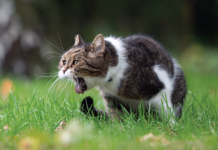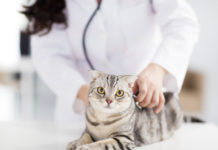Q. I live in southern Pennsylvania, and I have two domestic indoor/outdoor shorthaired cats, one 3-year-old male and one 7-year-old female. I have never given them heartworm preventive because I thought that cats do not get heartworm, but a friend recently told me that this is not true. Do I need to be worried about my kitties getting heartworm, and should they be on preventive medicine for this?
A. Thank you for contacting me about this issue, as there is a lot of confusion about heartworm disease in cats. This disease is caused by infection with the parasitic worm Dirofilaria immitis. The short answer is yes, cats can get heartworm disease (called dirofilariasis). In fact, feline heartworm disease has been reported in every state in the union and has a similar distribution to that seen in dogs. There are some important differences in the way that heartworm disease affects cats and dogs, though.
Heartworm is transmitted from one animal to another by the following mechanism:
– A mosquito ingests Dirofilaria larvae (called microfilaria, which is the young stage of the worm circulating in the blood) from an infected animal during a blood meal.
– The larvae mature to their infective form in the gut of the mosquito. When a mosquito takes a blood meal from another animal (such as a cat) the infective form of the larvae is injected into the animal.
– These newly injected larvae then migrate through the body tissues in the new host until they finally arrive as adults in the heart and blood vessels of the lungs. These adult worms can then breed and create new microfilaria, which circulate in the blood of the new host and start the infective cycle all over again.
Heartworm can cause problems by damaging the lining of the blood vessels in which they reside (mostly in the arteries carrying blood from the right side of the heart to the lungs), causing inflammation that may decrease the elasticity of the vessel and lead to elevation of pressure and to the development of blood clots.
They can also cause inflammation in the lungs leading to respiratory distress. Less commonly, the host can mount an immune response against the heartworms that can lead to damage of vital organs like the kidney.
Cats with heartworm disease are generally infected with fewer adult heartworms than dogs, and the worms generally survive for a shorter period of time when compared to the lifespan of an adult heartworm in a dog. This is also true of microfilaria in cats. In addition, a much smaller percentage of infective larvae develop to become adult worms in cats as compared to dogs.
Another difference between canine and feline heartworm is that in cats, it is much more common for the migrating larvae to travel to an unusual place like the central nervous system or the skin. This aberrant migration may cause significant damage to the tissue that it travels through.
Canine heartworm disease can be treated by administration of a drug that kills the adult worms and then by the administration of drugs that kill microfilaria. Given the fact that infected cats generally harbor low numbers of worms with short lifespans, that they often do not show signs of the disease, and that the drug used to kill adult worms is not approved for use in cats and may cause significant side effects, feline heartworm disease is most commonly not treated.
In most feline cases, careful monitoring and supportive care are elected, and the adult worms mature and die without causing significant problems. There is a possibility, though, that heartworm disease can cause significant health problems in any cat, and in rare cases, feline heartworm disease can be life threatening.
The American Heartworm Society recommends that all cats be given heartworm preventive medication. Four approved products for use in cats are available, and they are all considered safe and effective. I certainly recommend that you follow this advice and speak with your veterinarian about heartworm preventive for your babies.
I hope this is helpful, and please keep in touch. Best regards, Elizabeth ❖



